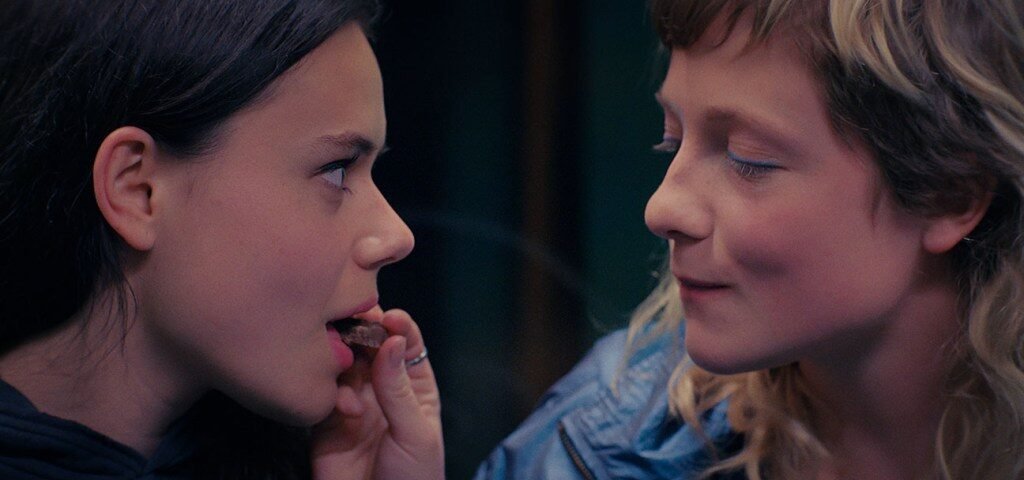


‘The Devil’s Bath’ Review: A Disturbing Psychodrama About a Woman Driven to Extremes in 18th-Century Rural Austria
February 27, 2024


‘No Other Land’ Review: A Sobering Doc Chronicles Violent Evictions of Palestinians in the West Bank
February 29, 2024The third feature by writer-director Claire Burger (‘Real Love’) co-stars Nina Hoss and Chiara Mastroianni as mothers of 17-year-olds on opposite sides of the French-German border.
Langue Etrangère
A moving cross-cultural coming-of-ager.
Crossing several borders at once, the coming-of-age romance Langue Étrangère leaps over state lines, overcomes language barriers and defies heteronormative boundaries to tell the story of two 17-year-old pen pals who fall for one another while visiting their mutual homes to brush up on their German and French.
What’s fascinating about Burger’s approach to such well-trod terrain as the international romance (everything from Green Card to Spanglish to the recent Emily in Paris comes to mind) is how there seem to be few real cultural barriers left between the shy, inhibited Fanny (Grasmug), who’s from France, and the outspoken and political Lena (Heinsius), who’s from Germany. They’re both somewhat bilingual already, have spent time in the other’s country, and when they don’t understand the meaning of a certain expression they can always use a translation app to find it. Such fluidity also extends to their budding sexuality — they never discuss if they’re gay or straight, and they may be a little bit of both. For many of today’s cosmopolitan teenagers, the traditional boundaries we grew up with no longer exist.
It takes a while for that to happen. At first, Fanny travels to Lena’s native Leipzig to spend a few weeks in her high school class so she can improve her German. She arrives at a household in disarray: Lena’s mother, Susanne (Nina Hoss, great as usual), has just separated from her long-term boyfriend and drowns her sorrows in too many glasses of white wine. Lena has little tolerance for her mother’s whining and barely welcomes her new guest (“My pen pal is not pally,” Fanny tells her mom over the phone). But when she sees how fragile Fanny can be, especially when she breaks down crying early on, Lena decides to introduce her to some friends and show her around Leipzig.
The contrast between the two is glaring: Lena is bold and has a rebellious streak, while the timid Fanny seems to be shaken by problems back home in France, where she claims she attempted suicide. A scene where their two classes meet via Zoom reveals where those problems may stem from, with Fanny’s French classmates mocking her as soon as they get the chance. It’s an uncomfortable sequence, as well as a telling one about the behavioral differences between the two countries. Burger also lands a few laughs when the kids are given the chance to ask the other class questions in the opposing language. (German question: “Why are the French always on strike? Don’t you guys like to work?”)
But Langue Étrangère is less about those differences than about the growing intimacy between the two girls, who spend a lot of time hanging out in Lena’s jacuzzi, creating a sexual tension that bubbles up when they take mushrooms at a party and engage in a three-way frolic with a boy — who seems to be there as a mere prop to get them closer together. Neither girl discusses her feelings aloud, because that’s the one language they can’t master, and Fanny heads back to France before anything is said between them.
Much of the second half hinges on the two girls searching for Fanny’s supposed hidden stepsister, who she claims is an anarchist involved in Strasbourg’s black block movement. Like many things Fanny says, it doesn’t seem entirely credible, at least to the viewer. But Lena is blinded by her own attraction and gets carried away in the search, which leads them to cut school and visit anarchist bars, creating more tension in Fanny’s home.
The movie gets increasingly political as the plot thickens, although the girls’ activism feels like another means to bring them closer together, even if Burger may have had more sincere intentions there. She’s better at depicting the jolt of emotions that hit Lena and Fanny when they can no longer ignore their feelings, leading to a finale where their respective barriers are dropped and the two finally manage to communicate clearly.
Shot in grainy handheld by Julien Poupard (Les Misérables), who uses a color palette of cloudy blues and grays, the film is very much a performance-based affair in which the excellent Grasmug and Heinsius do much of the heavy lifting. They’re well-supported by vets Hoss and Mastroianni, with the former providing the film’s one laugh-out-loud sequence when she completely loses it during a family lunch involving her ex.





